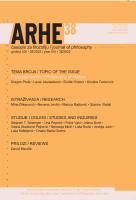“Human Exceptionalism”: The Greek Origins of a Modern Concept and Its Implications for the Lives of Animals
“Human Exceptionalism”: The Greek Origins of a Modern Concept and Its Implications for the Lives of Animals
Author(s): Stephen T. NewmyerSubject(s): Ethics / Practical Philosophy, Ancient Philosphy
Published by: Филозофски факултет, Универзитет у Новом Саду
Keywords: human exceptionalism; speciesism; anthropocentrism; Stoicism; oikeiōsis; cognitive ethology; kinship;
Summary/Abstract: The modern philosophical doctrine usually termed “human exceptionalism,” which holds that human beings, because of their perceived intellectual superiority over other animal species, have a moral value that cannot be claimed by other species which entitles humans to use other animals to serve their needs, has its philosophical roots in Greek philosophy, especially in the works of Aristotle and in the Stoic doctrine of oikeiōsis, which holds that human beings share a kinship with other humans but not with other species of inferior intellectual endowments. The doctrine of “human exceptionalism” is used in the twenty-first century to justify the wholesale slaughter worldwide of non-human animals for food, clothing, medical and entertainment purposes. The claims of “human exceptionalism” are countered in the present day by animal rights philosophers and by animal welfarists of various types who argue either that non-human species have a sufficient degree of reason to entitle them to inclusion in the sphere of human moral concern, or that the possession of reason is itself an irrelevant criterion for moral consideration, and that animal suffering must be taken into account in human interactions with other animal species.
Journal: Arhe
- Issue Year: 2022
- Issue No: 38
- Page Range: 183-206
- Page Count: 24
- Language: English

